Chemical
Protect your employees from hazardous chemicals with our EN 374 certified gloves. Whether nitrile, latex or PVC, we offer a wide selection of materials that are optimally suited to your area of application. Learn more about the standards that apply to protection against chemical risks and what factors to consider when choosing the right glove.
-
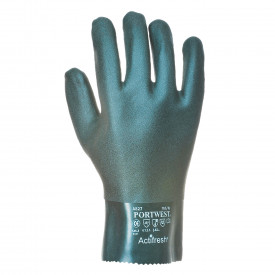
-
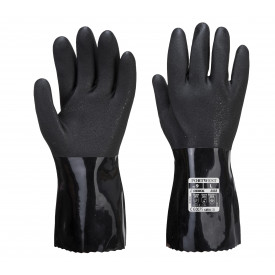
-
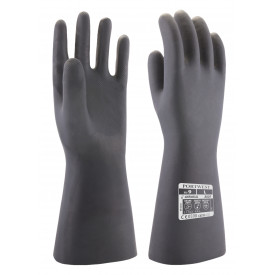
-
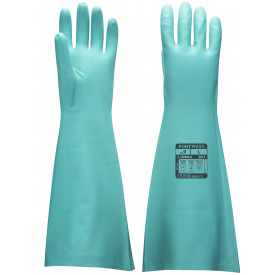
-
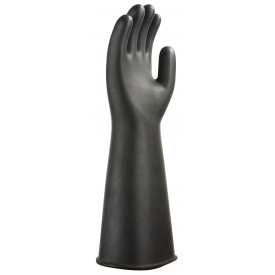
-
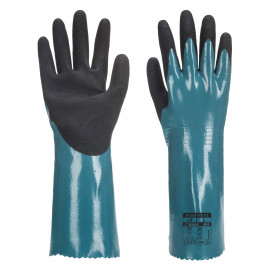
-
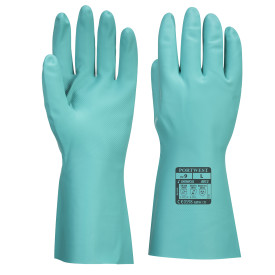
Nitrosafe Plus Chemical Gauntlet A812
Regular Price: €2.67
Special Price Excl. Tax: €2.11 Incl. Tax: €2.55
-
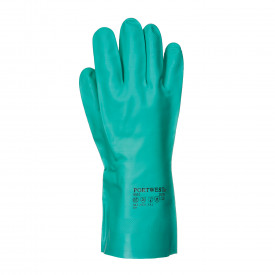
-
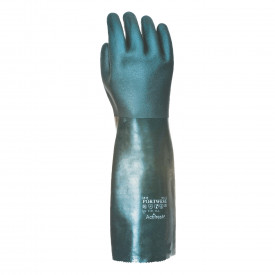
-
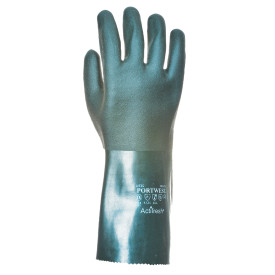

Why use chemical gloves at all?
Chemical protective gloves are an indispensable part of occupational safety. They protect employees from the dangers emanating from chemicals. Without this protection, serious injuries can result from contact with toxic substances. Chemical resistant gloves are the last line of defense against potentially fatal hazards. Exposure to acids, for example, can not only burn the skin, but also damage the employee's tissues. But chemical protective gloves not only protect against obvious dangers like this, but also against invisible threats, such as infection with dangerous viruses.
What is EN 374?
The EN ISO 374-1:2016 + A1:2018 standard specifies the requirements for protection against chemical risks. It is divided into several levels, each responsible for specific tests / applications and is supplemented by:
- EN 374-2:2019 + A1:2018, which deals with the resistance of gloves to penetration.
- EN 16523-1:2015 + A1:2018 (EN 374-3:2003) which examines the resistance of materials to penetration by chemicals and liquid chemicals under continuous contact.
- EN 374-4:2019+A1:2018, which deals with the resistance of materials to chemical deterioration
- EN ISO 374-5:2016+A1:2018 (+ ISO16604 / Method B) which deals with protection against bacteria, fungi and viruses.
How to choose the right material for protection against hazardous chemicals?
There is no universal glove that protects against all chemicals, as every material reacts differently to different chemicals. Nitrile gloves are made from synthetic rubber and offer good protection against most chemicals except ketones. Latex gloves are made of natural rubber and are particularly suitable for precise tasks and offer good protection against infection. PVC gloves are made from synthetic thermoplastic polymer and offer particularly good protection against acids, oils and greases, but less protection against organic solvents. It is important that you deal with the different materials and their properties in order to choose the right glove for the respective application.
In which industries are chemical gloves used?
Protective gloves that protect against injuries that can be caused by chemicals are essential in many areas. They are used in sectors such as the chemical and pharmaceutical industries, agriculture, the cleaning sector and the automotive industry. In medicine and research, workers often come into contact with chemicals on a daily basis and therefore need gloves that protect them from injuries and health risks. Also in agriculture, during cleaning work and in the automotive industry, workers regularly come into contact with chemicals and should therefore equip themselves with suitable protective gloves. An investment in the safety of your employees is an investment in the future viability of your company.
Chemical resistant gloves are essential to protect workers from hazardous chemicals. With our EN 374 certified gloves, we offer you a wide selection of materials that are ideal for your area of application. Find out more about our gloves now and protect your employees from potentially fatal hazards. Discover our high-quality products now.




















